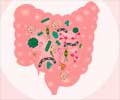While probiotics are generally safe in the short term, they are not universally effective, and different strains and combinations should be investigated separately.

‘Probiotics, the good bacteria found in certain foods and supplements, were found to provide no benefit in preterm infants.’





The authors said, "These two large trials suggest that, while probiotics are generally safe in the short term, they are not universally effective, and that different strains and combinations should be investigated separately."
The researchers conclude that the importance of gut microbes in the complex pathogenesis of necrotising enterocolitis is widely accepted. As understanding progresses so the rationale for the choice of probiotics that might have a therapeutic role either alone or in combination, and of which infants might benefit, should strengthen.
In the meantime, the evidence from this trial does not support the routine administration of probiotics to the preterm infant and the validity of combining trials of different probiotics to perform meta-analyses must be questioned.
The study appears in The Lancet.
Source-ANI















